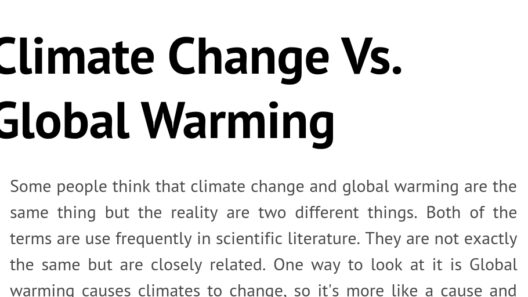In an increasingly interconnected world, the ramifications of climate change extend far beyond rising temperatures and melting ice caps; they reverberate through the framework of global commerce. The complex tapestry of international trade, long characterized by stability and predictability, is undergoing a seismic shift, catalyzed by the inexorable forces of global warming. This transformation presents myriad challenges and opportunities, necessitating an urgent reevaluation of existing economic paradigms and trade agreements.
To commence with an overarching understanding, global warming manifests through phenomena such as extreme weather events, shifting agricultural viability, and altered supply chain dynamics. The repercussions are profound, implicating every sector, from agriculture to technology, transportation to manufacturing. As ecosystems falter, entire industries waver under the pressure of volatility that global warming imposes.
The agricultural sector, for instance, epitomizes the intersection of climate change and commerce. Alterations in temperature and precipitation patterns complicate traditional farming practices. Regions that were once fertile may experience drought, while others may be inundated with excess rainfall. This unpredictability directly affects crop yields, compelling farmers to adapt swiftly or face economic ruin. Consequently, the fluctuations in agricultural output have a ripple effect, driving prices up on a global scale. This situation is exacerbated by the reality that many countries rely heavily on imports for staple foods, making them vulnerable to sudden price surges and production shortages.
Moreover, these agricultural disruptions are not confined to the economic sphere; they extend to food security issues, as nations scramble to secure sufficient resources to meet their populations’ needs. To compound the crisis, climate change amplifies competition for arable land and water resources, further straining international geopolitical relations. This rising tension frequently manifests in trade disputes, as nations prioritize their own agricultural interests at the expense of international agreements.
The consequences of these challenges are not uniform; rather, they disproportionately affect developing nations, which often have limited capacity to adapt to climatic changes. As these countries grapple with the dual burden of climate vulnerability and economic precarity, their ability to engage in international trade diminishes. Simultaneously, developed nations, though better equipped to navigate these vicissitudes, face escalating transportation costs, shifting trade routes, and burgeoning regulatory pressures tied to sustainability objectives. The result is a commercial milieu characterized by uncertainty and an elevated probability of trade friction.
Transportation, a critical enabler of global trade, also finds itself in the crosshairs of climate-induced disruption. Rising sea levels and increased frequency of severe weather events pose existential threats to major shipping routes and ports. The logistics sector, which thrives on efficiency and reliability, must now contend with the prospect of interrupted supply chains and heightened operational costs. Adjustments in shipping routes, enhanced port infrastructure to accommodate changing sea levels, and investments in more resilient vessels represent the immediate responses to such challenges. However, these adaptations require significant capital investment and innovative thinking—a daunting task for many companies entrenched in conventional practices.
Furthermore, the need for diversification in both sourcing and markets is paramount in an era punctuated by climate unpredictability. Businesses that have long relied on singular supply chains may find themselves vulnerable should localized climate impacts impede production. As a result, organizations are increasingly exploring alternative sources, including local suppliers and new markets that may be less susceptible to climatic extremes. This diversification is not merely a strategy for resilience; it is also a pathway to harnessing new consumer bases increasingly desiring sustainable and ethically sourced products.
As consumers grow more attuned to the exigencies of climate change and demanding transparency from corporations, businesses face mounting pressure to adopt sustainable practices. Indeed, the emergence of “green trade” represents a fresh frontier, where marketplace dynamics pivot towards sustainability. Eco-friendly products and circular economy models are paramount in this evolving landscape, encouraging a metamorphosis in production, consumption, and disposal paradigms. Companies that successfully align their operations with sustainable practices not only safeguard their market positions but also unlock new opportunities for growth in an eco-conscious consumer landscape.
Ultimately, the narrative of trade and global commerce in the context of climate change is not devoid of hope. The challenges presented by global warming can inspire innovative solutions that redefine business operations worldwide. The pursuit of renewable energy sources can lead to the emergence of entirely new industries, resulting in job creation and economic revitalization. Similarly, advancements in technology offer potential avenues for enhancing agricultural resilience and improving logistics efficiency. The trial and tribulation instigated by climate change has the potential to galvanize collective action, uniting stakeholders from various sectors to forge resilient systems that prioritize environmental stewardship while driving economic progress.
In conclusion, the implications of global warming on global commerce are both extensive and complex. As agricultural markets grapple with climate-induced disruptions, transportation networks brace for volatility, and consumers demand sustainable practices, the landscape of international trade is poised for transformation. Recognizing and responding to these fluctuations is imperative for businesses and policymakers alike. As attention turns to innovative practices and sustainable trade models, there lies the promise of a new economic paradigm—one that balances commerce with ecological integrity. The time for decisive action is now, as the future of global trade hinges on our collective response to the pressing challenge of climate change.








